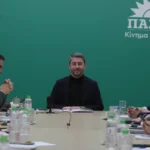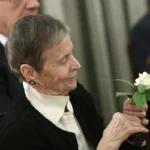The Directors of The Greek Orthodox Community of Melbourne & Victoria (GOCMV), have called upon its members to adopt the so called “Modernised Version” constitution to replace the current one. The Special General Meeting for the replacement of the constitution is scheduled to take place on Sunday 21st July at Alphington Grammar, at 5pm.
After eighteen months of a problematic consultation process, the members have been provided -FOR THE FIRST TIME- the opportunity to read through the “Modernised Version” of the organisation’s constitution, distributed by the Board of the GOCMV just four (4) weeks prior to the meeting.
Procedural flaws:
- The Directors have failed to provide the Greek version of the “Modernised Version” of the constitution to the members, although they are clearly aware that a significant percentage of the GOCMV membership are first generation Greeks, and that it would be an impossible task for those members to navigate through, and understand the complexities of a new governing document written in English.
- The wording of the notification distributed, clearly proves that constitutional proposals submitted by members will NOT be discussed at the Special General Meeting. For example, the notice implies that if the “Modernised Version” of the constitution DOES NOT pass then the “Members Proposal” will be withdrawn. (Logic implies that if the “Modernised Version” is adopted then there will be no need to table the “Members Proposal”).
Sample Articles:
Below are a few examples of certain proposed Articles of the “Modernised” constitution which the current Directors are seeking the approval of members at the Special General Meeting.
- The newly proposed Article 5.1 completely alters the nature of the organisation and how it has operated for the last one hundred years. The proposed amendment provides Directors the “exclusive and ultimate responsibility of managing the business affairs of the organisation” and eliminates any membership safeguards that were previously entrenched.
Previously, Directors could be subject to the control and direction of a General Meeting; a safeguard that now will be discarded.
- The newly proposed Article 6.8 articulates the procedure that is required when electing an election committee. The proposal stipulates, that those who wish to nominate must do so 7 days prior to the meeting. If the required number of candidates is not fulfilled then the incumbent Directors – who can re-nominate – have the right to appoint members to election committee.
Previously, electoral committees were elected at General Meetings.
Such an amendment raises questions of electoral imparity and may provide a legitimate avenue for those candidates, nominating to be elected as Directors, to legally challenge the validity of the organisation’s elections.
- The newly proposed Article 5.4 exclusively provides Directors the right to appoint any member they wish to the Board, if and when a vacancy occurs. The proposed amendment creates an avenue for the Directors to exclude those candidates who may have been “runners up” in the elections. For example, it is feasible for a candidate – who nominated and received over 40% of the votes and failed to be elected – to be excluded if a Board vacancy arises. Up until now “the candidate who secured the largest number of votes at the said elections” would fill the vacancy.
This proposal potentially alters the parameters of an electoral process and creates a defacto centralised mode of governance. This is another change that seriously undermines the democratic principles of our organisation.
- The newly proposed Article 9.2 outlines the process by which “business for a General Meeting” will henceforth be conducted. Under the “Modernised Version” constitution, any notice for General Business must be submitted 60 days or more prior to a General Meeting.
This heralds the end of any membership proposals or scrutiny. A 60-day limitation is a blatant attempt to diminish membership participation and regrettably fosters a notion of absolute power.
- What is even more alarming with the proposed amendments that relate to: (a). the election of the electoral committee, (b). the question of Board vacancies and c. the matter of General business, is that the Directors have the discretion to call a General Meeting within a seven (7) day time frame according to the newly proposed Article 9.3.; inevitable favouring the incumbent Directors when it comes to nominations for elections, or nominating members for the election committee. In the case of those non incumbent candidates, wishing to nominate as Directors or as members of the election committee, the process to nominate for candidacy almost becomes unfeasible.
Finally, we question the Directors’ motive in increasing the number of members required to requisition a Special General Meeting from 50 to 200. Such an amendment abolishes any adequate or meaningful opportunities for members to raise concerns about how the organisation is run; a fundamental governance standard stipulated by the National regulatory authorities (Australian Charities and Not-for-profits Commission and the Australian Securities & Investments Commission). It should be pointed out that Judge Finkelstein in 2003 clarified both the process and purpose by which members can requisition a Special General Meeting according to the Articles of the current constitution and the relevant legislation.
These indicative five (5) proposed Articles of the “Modernised Version” of the constitution discard the very basic democratic principles of a community-based organisation. The Board’s concept of constitutional “modernisation” is ambiguous and departs from the inherent logic of what constitutes proper management and governance of a charitable organisation. Clearly these proposals also eliminate any auxiliary precautions that will prevent abuse of power.
As Judge Finkelstein accurately observed in a Federal Court case in 2003:
“Perhaps mindful of their heritage, the corporators of the company known as the Greek Orthodox Community of Melbourne and Victoria (“the Community”) adopted a different approach. Article 11 of the Community’s articles of association provides that the management of the Community’s affairs shall vest in a general committee and that this committee “shall at all times be subject to the control and directions of the Community in General Meeting and shall comply with all such resolutions as may be adopted from time to time by the Community in (sic) general meeting.”
It is this unique feature and safeguard that will be eradicated with the adoption of the Board’s proposed “Modernised” constitution, radically changing the nature of Australia’s oldest Greek community organisation.
If the Board of Directors respects both the membership and history of the organisation, then it should immediately cancel the scheduled Special General Meeting.
Signed: Current and former members of the Greek Orthodox Community of Melbourne and Victoria
Leonidas Argyropoulos
Steve Bakalis
Elias Diacolabrianos
Peter Darmos
Christos Fifis
Savvas Grigoropoulos
Makis Hatzilepos
George Karagiannis
Kostas Karamarkos
Costas Kazantzis
Marrietta Kokkas
George Koletsis
Siobhan Koletsis
Apostolis Kounelis
Dimitra Lagoudaki
Stan Lilimbakis
Effie Maltezos
Eleni Maltezou
Aggelos Makrigiorgos
Rita Manessis
Costas Markos
Dissio Markos
Theodoros Markos
George Messinis
Michális S. Michael
Dimitris Paikopoulos
Niki Pezaros
Nontas Pezaros
Evangelos Plokamakis
Elias Rallis
Eleni Stamenitis
Nick Tsaktsiras
George Vassilacopoulos
Steve Vakkas
Vasso Zangalis
Harry Zaverdinos












